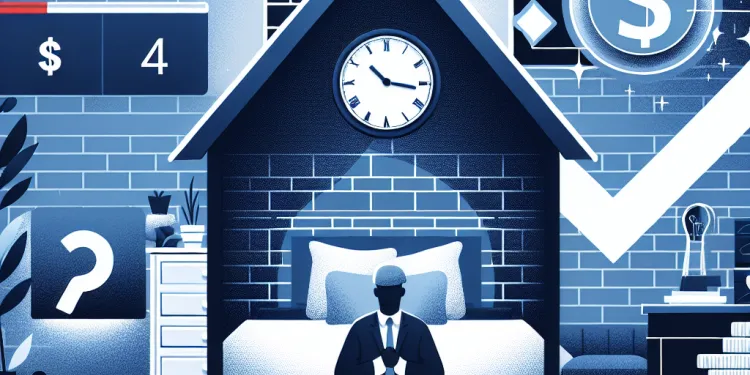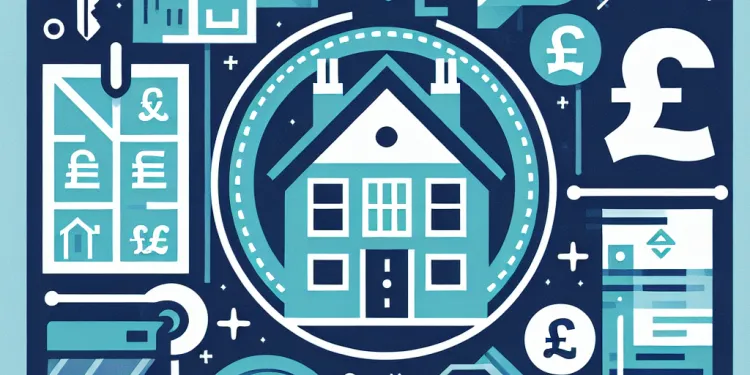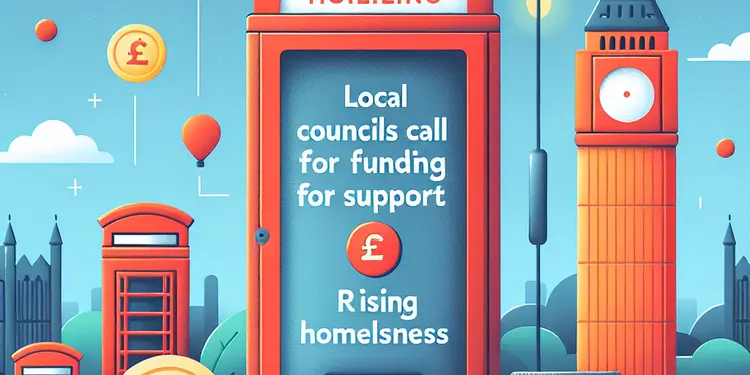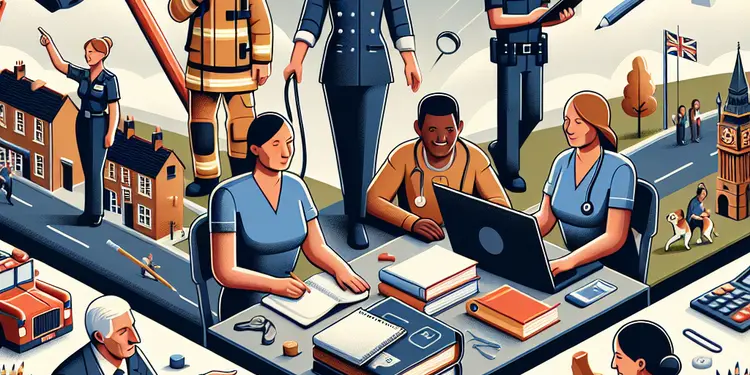
Find Help
More Items From Ergsy search
-

Impact of UK Housing Crisis on Local Communities
Relevance: 100%
-

Impact of Housing Shortage on Local Communities
Relevance: 69%
-

Addressing the Housing Crisis: Current Challenges and Solutions
Relevance: 64%
-

Addressing the Cost of Living Crisis: Community Support and Resources
Relevance: 59%
-

Navigating the UK Cost of Living Crisis: Tips for Families
Relevance: 46%
-

Mental Health Impact of Cost of Living Crisis and Support Resources
Relevance: 40%
-

Addressing the Rising Homelessness Crisis
Relevance: 40%
-

How do I find alternative housing quickly if evicted?
Relevance: 39%
-

The Rise of Community Food Banks: Combating Hunger Locally
Relevance: 39%
-

How can individuals contribute to the discussion on housing benefit cuts?
Relevance: 35%
-

What role do housing associations have amid these cuts?
Relevance: 35%
-

Local Councils Struggle with Increasing Demand for Welfare Support
Relevance: 35%
-

Impact of Cost of Living on UK Communities
Relevance: 34%
-

UK's Elderly Population Faces Growing Loneliness Crisis
Relevance: 33%
-

What are the proposed Cuts to Housing Benefits Amid Rising Rents?
Relevance: 33%
-

How can community helpers access emergency assistance?
Relevance: 33%
-

What measures are suggested to substitute the housing benefits?
Relevance: 32%
-

Addressing the Rising Cost of Living: Community Support and Resources
Relevance: 32%
-

What housing assistance options are available for seniors?
Relevance: 31%
-

What types of support are available for community helpers?
Relevance: 31%
-

Amberwood House (Colten Care)
Relevance: 29%
-

Can community helpers receive financial assistance?
Relevance: 29%
-

What incentives are provided for sustainable housing?
Relevance: 29%
-

Local Councils Call for More Funding to Support Rising Homelessness
Relevance: 28%
-

Is there a plan to offer additional support to offset housing benefit cuts?
Relevance: 28%
-

What is the role of community hubs in supporting helpers?
Relevance: 28%
-

What help is available to helpers in the community?
Relevance: 28%
-

UK House Prices Fall for Third Consecutive Month
Relevance: 28%
-

What is a dementia-friendly community?
Relevance: 28%
-

What is the role of community centers in supporting senior citizens?
Relevance: 27%
-

How can I support my local food bank?
Relevance: 27%
-

What are the potential long-term impacts of housing benefit cuts?
Relevance: 27%
-

Who will be most affected by the proposed cuts to housing benefits?
Relevance: 27%
-

Is there any legal recourse for those affected by the housing benefit cuts?
Relevance: 27%
-

What is the relationship between rising rents and housing benefit cuts?
Relevance: 27%
-

Where can community helpers find networking opportunities?
Relevance: 26%
-

Are there mentorship programs for community helpers?
Relevance: 25%
-

How can community helpers access educational resources?
Relevance: 25%
-

How can older adults find local hobby groups?
Relevance: 25%
-

Cost of Living Crisis: Supermarkets Promise More Discounts for Shoppers
Relevance: 24%
Impact of UK Housing Crisis on Local Communities
Introduction to the UK Housing Crisis
The UK housing crisis has been a persistent issue, characterized by skyrocketing property prices, a shortage of affordable homes, and increased homelessness. Inefficiencies in housing allocation and supply have exacerbated these problems, leading to significant social and economic repercussions. This crisis has impacted local communities adversely, creating a wide array of challenges for residents across the country.
Social Implications
The social ramifications of the housing crisis are profound. With property prices and rent escalating beyond the reach of many, local communities are witnessing a rise in homelessness and housing instability. Families forced to move frequently in search of affordable housing disrupt community cohesion and continuity in children’s education. The sense of community, a core element defining local neighborhoods, is consequently weakened as residents are displaced.
Economic Consequences
Economically, the housing crisis has strained both local and national resources. When affordable housing is scarce, individuals spend a larger portion of their income on rent or mortgage payments, reducing disposable income and dampening local economic activities. Small businesses suffer as customer spending declines, impacting local economies. Additionally, local authorities face mounting fiscal pressures to provide housing support services, which often results in increased council taxes or reallocation of funds from other vital services.
Health Impacts
The health impacts of inadequate housing are also significant. Overcrowded, unsuitable living conditions contribute to physical illnesses such as respiratory problems and mental health issues like stress and anxiety. The instability of temporary housing arrangements fosters uncertainty and anxiety, further exacerbating mental health issues within communities.
Conclusion
The UK housing crisis is a multifaceted problem deeply affecting local communities. Social cohesion, economic stability, and public health are compromised due to insufficient affordable housing. Addressing this crisis necessitates collaborative efforts from government, private sector, and local communities to create sustainable solutions. Strategic planning and investment in affordable housing will be crucial to restoring stability and fostering thriving local communities across the UK.
Impact of UK Housing Crisis on Local Communities
Introduction to the UK Housing Crisis
The UK has a big problem with housing. Houses and flats cost too much money. There are not enough cheap homes for people. More people are becoming homeless. This is because houses are not being shared out well. This causes problems for people in towns and cities all over the UK.
Social Implications
The housing problem has a big effect on people and their lives. Houses and flats cost a lot, and rent is more than many people can pay. This means more people are becoming homeless or have to move often. When families move a lot, kids have to change schools, which can be hard for them. People who move a lot may feel less part of their neighborhood and community.
Economic Consequences
The housing problem also affects money and jobs. If homes cost too much, people spend most of their money on rent or buying houses. This means they have less money to spend in shops. When people spend less, local shops and businesses suffer. Local councils have to find more money to help people with housing, which can make taxes go up.
Health Impacts
Living in bad housing can make people sick. Crowded homes can cause illnesses, like breathing problems. Moving a lot or living in temporary homes can make people worried and stressed. This can lead to mental health problems.
Conclusion
The UK housing problem affects many parts of life in towns and cities. It makes it harder for people to feel part of a community, affects the local economy, and can make people sick. To fix this, everyone needs to work together. The government, businesses, and local communities need to plan and build more cheap homes. This will help make towns and cities better places to live.
Helpful Tips
Using tools like text-to-speech software can help understand this topic better. Talking with friends or family about housing can also help. Breaking down the information into smaller parts can make it easier to learn.
Frequently Asked Questions
What are the main causes of the UK housing crisis?
The main causes of the UK housing crisis include a shortage of new homes being built, rising property prices, and an increase in demand due to population growth and urbanization.
How does the housing crisis affect local communities?
The housing crisis affects local communities by increasing homelessness, reducing affordability, and putting pressure on local services and infrastructure. It can also lead to social displacement and affect community cohesion.
What are the impacts of high property prices on local residents?
High property prices can lead to unaffordable housing, forcing residents to move away from their communities, increasing commuting distances, and creating social inequality.
How does the housing crisis affect renters?
Renters face higher rent prices, reduced housing stability, and often poorer living conditions. The crisis can also limit renters' ability to save for a deposit to buy a home.
What role does government policy play in the housing crisis?
Government policy can influence the housing crisis through planning regulations, housing subsidies, and initiatives aimed at increasing housing supply. Effective policies are crucial for addressing the root causes of the crisis.
How does the lack of affordable housing impact families?
Lack of affordable housing can lead to overcrowding, increased stress, lower quality of life, and difficulties in accessing essential services such as schools and healthcare.
What can local governments do to address the housing crisis?
Local governments can implement policies to encourage the construction of affordable housing, provide support for low-income households, and manage planning processes to ensure a balanced housing market.
How does the housing crisis affect young people?
Young people may struggle to find affordable housing, leading to delayed milestones such as leaving home, starting a family, or purchasing a property. This can impact their long-term financial stability and independence.
What is the connection between the housing crisis and homelessness?
The housing crisis contributes to homelessness by reducing the availability of affordable housing options, increasing evictions, and limiting access to emergency and social housing.
How are rural communities impacted by the housing crisis?
Rural communities may experience housing shortages, increased property prices, and a lack of affordable housing options, leading to outmigration of younger residents and an aging population.
What effect does the housing crisis have on social inequality?
The housing crisis exacerbates social inequality by limiting access to affordable housing for low-income households, increasing homelessness rates, and creating disparities in living conditions and opportunities.
How does the housing crisis contribute to mental health issues?
The stress and uncertainty associated with housing instability can contribute to mental health issues such as anxiety, depression, and stress-related disorders, particularly among vulnerable populations.
What role do housing developers play in the crisis?
Housing developers play a significant role by determining the types and prices of new housing. Ensuring that developments include affordable housing is crucial for addressing the crisis.
How can individuals get involved in addressing the housing crisis?
Individuals can get involved by supporting local housing initiatives, advocating for policy changes, participating in community planning meetings, and helping to raise awareness about the issues and potential solutions.
Are there any successful examples of solutions to the housing crisis?
Yes, successful examples include cities that have implemented policies to increase affordable housing, such as inclusionary zoning, rent controls, and targeted subsidies for low-income households.
Why is it hard to find a home in the UK?
The UK has a big problem with housing. There are three main reasons:
1. Not enough new homes are being built.
2. House prices keep going up.
3. More people need homes because the population is growing and more people want to live in cities.
To help understand, you can try using pictures or videos. You can also ask someone to explain if you have questions.
How does the problem with not enough houses affect where people live?
The housing problem makes things hard for local areas. It means more people do not have homes, houses cost more money, and local services get very busy. It can also make people have to move away and can break up communities.
How do high house prices affect people living nearby?
When house prices go up, it can change things for people who live there.
Here is how it can affect them:
- Cost of living: If houses cost more, other things might cost more too. It can be harder for people to buy things they need.
- Moving away: Some people might have to move to cheaper places because they can't afford to live there anymore.
- Renting: Rent can also go up. This means paying more money each month to live there.
- Community changes: When people move, the neighborhood can change. New people might come in, and some old neighbors might leave.
To help, people can:
- Use apps or websites to see what houses cost in different areas.
- Talk to someone who knows about money, like a financial advisor.
- Join community groups to find support and advice.
When houses cost a lot of money, people might not be able to afford them. This means they might have to leave their homes and move far away. It can make it harder for everyone to have the same chances.
Here are some tips to help you understand:
- Use drawing or pictures to show what you read.
- Ask someone to talk it through with you.
- Try reading out loud.
What happens to people who rent homes when there are not enough places to live?
People who rent homes have some problems. Rent costs go up, which makes it hard to pay. Sometimes, renters have to move. The homes they live in might not be in good shape. This can make it tough to save money to buy their own home.
Helpful Tips: Use simple math apps to help manage your money and make a budget. Ask someone you trust for advice on saving money. Consider talking to a housing advisor who can give you tips.
How do government rules affect the housing problem?
Government rules can make housing better or worse. These rules are like instructions for building and selling homes.
Here is how government rules can help:
- They can give money to build more homes.
- They can make sure homes are safe and nice to live in.
- They can help people who do not have enough money.
Here is how government rules can cause problems:
- If there are too many rules, it can be hard to build new homes.
- Rules about land can make some places too costly for new homes.
If you want to know more about how rules work, you can use pictures or charts to help understand better. You can also ask an adult to explain with simple words.
The government makes rules about houses. These rules can change things like how many houses can be built or how much money people get to help buy a house. The government can also start programs to build more houses. These actions are important to fix the big problem of not having enough homes.
What happens to families when homes cost too much?
When homes are too expensive, families can have problems. Here are some things that might happen:
- Families might not have enough money for other things, like food or clothes.
- They might have to move a lot if they can't pay the rent.
- Children might not do well in school because they have to move or feel worried.
- Parents might feel stressed because they have to work more to pay for the home.
Here are some ways families can get help:
- Talk to a money helper to plan a budget.
- Ask for help from local community groups.
- Look for information online about help with housing.
When houses cost too much money, it can be hard to find a good place to live. This can make homes too crowded, make people worry more, and make life not as nice. It can also make it hard to get to important places like schools and the doctor.
How can local governments help with the housing problem?
Local governments can do things to help people find homes. Here are some ideas:
- Build more houses so there are enough for everyone.
- Make sure houses are safe and people can afford them.
- Help people who cannot pay for a home by giving them some money or discounts.
- Work with builders to make sure they build homes that people need.
If you find it hard to read or understand, you can use tools like audiobooks or ask someone to read it with you. Drawing pictures about the ideas can also help you understand better.
Local councils can make rules to help build cheap homes. They can help people who don’t have much money. They can also make sure there are enough homes for everyone by planning carefully.
How does the housing crisis affect young people?
The housing crisis makes finding a home hard for young people.
Houses and apartments cost a lot of money.
This means many young people can't afford to buy or rent a home.
Some tools and tips can help:
- Use budget apps to save money.
- Look for housing support services in your area.
- Ask family or friends for advice on finding a good home.
Young people might find it hard to get a home they can afford. Because of this, they might live with their parents longer, wait to have a family, or not buy a house right away. This can make it hard for them to save money and be independent in the future.
How are the housing crisis and homelessness linked?
The housing crisis means there aren't enough homes for everyone. This can make houses very expensive.
When homes cost too much, some people can't pay for them. This can lead to homelessness.
If more homes are built, it might help people find places to live and stop being homeless.
Tools like picture dictionaries can help you understand words better. Talking about these ideas with someone can also help you understand them.
The housing problem makes more people become homeless. This is because there are not enough cheap homes, more people are being forced to leave their homes, and it is harder to find places to stay in emergencies or get help from social services.
For people who need help understanding this, you can try:
- Reading slowly and pausing to think about each part.
- Using pictures to see what the words mean.
- Asking someone to explain if you do not understand.
How does the housing crisis affect people living in the countryside?
The housing crisis means there are not enough homes or they are too expensive. This affects people living in the countryside too.
Here are some ways it affects them:
- There might not be enough homes for everyone.
- Homes can be too costly for families to buy or rent.
- This can make it hard for people to stay in the area where they grew up.
To help understand better, here are some tips:
- Use picture cards to show what a housing crisis means.
- Ask someone to explain any hard words.
- Talk about it with a friend or family member.
People living in the countryside might find it hard to get houses. There might not be enough homes, and they could be very expensive. This means young people might move away. More old people might stay behind.
How does the housing problem make it unfair for people?
The housing problem means that there are not enough homes for everyone. This makes it hard for people to find a place to live.
Some people have lots of money and can buy or rent nice homes. But some people do not have much money. They find it hard to get a good home. This is not fair.
When some people have nice homes and others do not, it makes life unfair. This is called social inequality. Everyone should have a good place to live.
If you find reading hard, you can ask someone to read it with you. Point to the words as they read to help you understand better.
The housing problem makes life unfair for many people. It is hard for some families to find homes they can pay for. This can make more people lose their homes or live in worse places. It also means some people have fewer chances in life.
If reading is hard, try using tools like audiobooks or apps that read text out loud. These can help you understand information better.
How does not having enough homes affect our feelings?
When there aren't enough homes, it can make people feel worried or sad. It's like when you don't have a safe place to go. This can affect your mind and feelings. Here are some ways it can help: - Talk to someone you trust about how you feel. - Try to stay positive and think of happy things. - Find activities that you enjoy and help you relax.
Worrying about not having a stable home can affect your feelings. It can make people feel very worried, sad, or stressed out. This is especially true for people who are already having a hard time.
How do housing developers affect the problem?
Housing developers are people or companies who build new homes. They can help or make the housing problem worse. Here are some ways they can affect the problem:
- Building Homes: When developers build more homes, it can help people find places to live.
- Expensive Houses: Sometimes, developers build very expensive homes that many people cannot afford.
- Using Land: Developers need land to build on. They can help by using empty areas, but if they use too much land, it can harm the environment.
- Community Impact: Building homes changes local areas and can make them better or worse for people who live there.
To make it easier to understand, try these tips:
- Use pictures to show what developers do.
- Ask someone to explain the parts you find difficult.
- Talk about the topic with a friend to understand it better.
People who build houses decide what kind of houses get built and how much they will cost. It is important to make sure some of these houses are cheap enough for people to afford. This helps solve the problem where people do not have enough money to buy houses.
Using pictures and charts can help understand this better. It can also help to look at simple examples or videos about house building.
How can people help fix the housing problem?
There are lots of ways you can help with the housing problems.
Here are some ideas:
- Learn: Read simple books and watch videos about housing.
- Talk: Chat with friends and family about housing and tell them how they can help too.
- Volunteer: Help out at places that build homes for people.
- Join groups: Find local groups that are working to fix housing problems and join them.
- Write: Send a letter to your leaders asking them to make sure everyone has a good home.
Tools that can help you:
- Use pictures to help learn about housing.
- Find videos online that explain housing problems.
- Ask someone you trust to help you read difficult words.
You can help with housing by doing these things:
- Support local groups that work on housing.
- Talk to leaders about changing rules.
- Go to meetings where people plan community projects.
- Help others know about housing problems and how to fix them.
Have people found good ways to fix the housing problem?
Some places have found ways to help with housing. These ideas can help people find homes.
Here are some helpful ideas:
- Build more houses that people can afford.
- Help people pay for their homes.
- Fix old buildings so people can live in them.
Using picture charts or videos can help explain these ideas better.
Yes, some cities have done a good job by helping people find homes they can afford. They used special rules like making sure some new homes are cheaper, controlling how much rent can go up, and giving money help to families who don't have a lot of money.
Useful Links
Have you found an error, or do you have a link or some information you would like to share? Please let us know using the form below.
-->
This website offers general information and is not a substitute for professional advice.
Always seek guidance from qualified professionals.
If you have any medical concerns or need urgent help, contact a healthcare professional or emergency services immediately.
Some of this content was generated with AI assistance. We’ve done our best to keep it accurate, helpful, and human-friendly.
- Ergsy carfully checks the information in the videos we provide here.
- Videos shown by Youtube after a video has completed, have NOT been reviewed by ERGSY.
- To view, click the arrow in centre of video.
- Most of the videos you find here will have subtitles and/or closed captions available.
- You may need to turn these on, and choose your preferred language.
- Go to the video you'd like to watch.
- If closed captions (CC) are available, settings will be visible on the bottom right of the video player.
- To turn on Captions, click settings .
- To turn off Captions, click settings again.
More Items From Ergsy search
-

Impact of UK Housing Crisis on Local Communities
Relevance: 100%
-

Impact of Housing Shortage on Local Communities
Relevance: 69%
-

Addressing the Housing Crisis: Current Challenges and Solutions
Relevance: 64%
-

Addressing the Cost of Living Crisis: Community Support and Resources
Relevance: 59%
-

Navigating the UK Cost of Living Crisis: Tips for Families
Relevance: 46%
-

Mental Health Impact of Cost of Living Crisis and Support Resources
Relevance: 40%
-

Addressing the Rising Homelessness Crisis
Relevance: 40%
-

How do I find alternative housing quickly if evicted?
Relevance: 39%
-

The Rise of Community Food Banks: Combating Hunger Locally
Relevance: 39%
-

How can individuals contribute to the discussion on housing benefit cuts?
Relevance: 35%
-

What role do housing associations have amid these cuts?
Relevance: 35%
-

Local Councils Struggle with Increasing Demand for Welfare Support
Relevance: 35%
-

Impact of Cost of Living on UK Communities
Relevance: 34%
-

UK's Elderly Population Faces Growing Loneliness Crisis
Relevance: 33%
-

What are the proposed Cuts to Housing Benefits Amid Rising Rents?
Relevance: 33%
-

How can community helpers access emergency assistance?
Relevance: 33%
-

What measures are suggested to substitute the housing benefits?
Relevance: 32%
-

Addressing the Rising Cost of Living: Community Support and Resources
Relevance: 32%
-

What housing assistance options are available for seniors?
Relevance: 31%
-

What types of support are available for community helpers?
Relevance: 31%
-

Amberwood House (Colten Care)
Relevance: 29%
-

Can community helpers receive financial assistance?
Relevance: 29%
-

What incentives are provided for sustainable housing?
Relevance: 29%
-

Local Councils Call for More Funding to Support Rising Homelessness
Relevance: 28%
-

Is there a plan to offer additional support to offset housing benefit cuts?
Relevance: 28%
-

What is the role of community hubs in supporting helpers?
Relevance: 28%
-

What help is available to helpers in the community?
Relevance: 28%
-

UK House Prices Fall for Third Consecutive Month
Relevance: 28%
-

What is a dementia-friendly community?
Relevance: 28%
-

What is the role of community centers in supporting senior citizens?
Relevance: 27%
-

How can I support my local food bank?
Relevance: 27%
-

What are the potential long-term impacts of housing benefit cuts?
Relevance: 27%
-

Who will be most affected by the proposed cuts to housing benefits?
Relevance: 27%
-

Is there any legal recourse for those affected by the housing benefit cuts?
Relevance: 27%
-

What is the relationship between rising rents and housing benefit cuts?
Relevance: 27%
-

Where can community helpers find networking opportunities?
Relevance: 26%
-

Are there mentorship programs for community helpers?
Relevance: 25%
-

How can community helpers access educational resources?
Relevance: 25%
-

How can older adults find local hobby groups?
Relevance: 25%
-

Cost of Living Crisis: Supermarkets Promise More Discounts for Shoppers
Relevance: 24%


